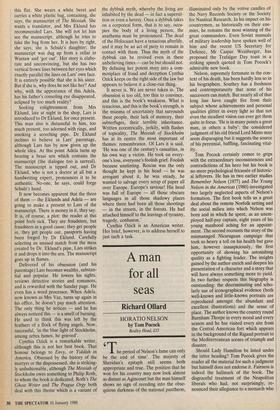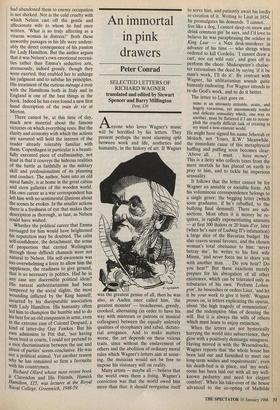A man for all seas
Richard 01lard
HORATIO NELSON by Tom Pocock
Bodley Head, f15
The period of Nelson's fame can only be the end of time'. The majesty of Sheridan's epitaph still seems both appropriate and true. The position that he won for his country may now look almost as distant as Agincourt but the man himself shows no sign of receding into the obse- quious darkness of the national pantheon, illuminated only by the votive candles of the Navy Records Society or the Society for Nautical Research. In his impact on his countrymen, as historically on their ene- mies, he remains the most winning of the great commanders. Even Soviet manuals of military leadership have spoken well of him and the recent US Secretary for Defence, Mr Caspar Weinberger, has proposed the Trafalgar Day toast in a striking speech quoted in Tom Pocock's admirable new book.
Nelson, supremely fortunate in the con- text of his death, has been hardly less so in his biographers. Southey has a freshness and contemporaneity that none of his successors can match. But nearly all of that long line have caught fire from their subject whose achievements and personal qualities glitter in every light so that not even the steadiest vision can ever get them quite in focus. 'He is in many points a great man, in others a baby': the considered judgment of his old friend Lord Minto may seem disparaging but it suggests the source of his perennial, baffling, fascinating vital- ity.
Tom Pocock certainly comes to grips with the extraordinary inconsistencies and contradictions of his hero but his book is no mere psychological fricassee of historic- al leftovers. He has in two earlier studies Remember Nelson (1977) and The Young Nelson in the Americas (1980) investigated two largely neglected aspects of Nelson's formation. The first book tells us a great deal about the remote Norfolk setting and the social milieu into which Nelson was born and in which he spent, as an unem- ployed half-pay captain, eight years of his young manhood aching for an appoint- ment. The second recounts the story of the mismanaged Nicaraguan campaign that took so heavy a toll on his health but gave him, however inauspiciously, the first opportunity of showing his astonishing quality as a fighting leader. The insights gained by the author enrich and deepen his presentation of a character and a story that will have always something more to yield. In two further respects this biography is outstanding: the discriminating and scho- larly use of iconographical evidence (both well-known and little-known portraits are reproduced amongst the abundant and excellent illustrations) and the sense of place. The author knows the country round Burnham Thorpe in every mood and every season and he has visited every site from the Central American fort which appears in the background of the Rigaud portrait to the Mediterreanean scenes of triumph and disaster.
Should Lady Hamilton be listed under the latter heading? Tom Pocock gives the reader all the material for such a judgment but himself does not endorse it. Fairness is indeed the hallmark of the book. The disgraceful treatment of the Neapolitan liberals who had, not surprisingly, re- nounced their allegiance to a monarch who had abandoned them to enemy occupation is not shirked. Nor is the cold cruelty with which Nelson cast off the gentle and affecionate wife to whom he had once written, 'What is so truly affecting as a vituous woman in distress?' Both these unworthy passages in his life were undeni- ably the direct consequence of his passion for Lady Hamilton. But the author argues that it was Nelson's own emotional necessi- ties rather than Emma's seductive arts, strenuously, indeed grossly, though they were exerted, that enabled her to unhinge his judgment and to subdue his principles. His treatment of the curious menage a trois with the Hamiltons both in Italy and in England is one of the best things in the book. Indeed he has even found a new first hand description of the train de vie at Merton.
There cannot be, at this time of day, much new material about the famous victories on which everything rests. But the clarity and economy with which the actions are narrated will hold the interest of the reader already tolerably familiar with them. Copenhagen in particular is a beauti- fully executed piece of craftmanship, not least in that it conveys the hideous realities of the battle as faithfully as the military skill and professionalism of its planning and conduct. The author, born into an old naval family, is at home in the great cabins and stern galleries of the wooden world. His own career as a war correspondent has left him with no sentimental illusions about the scenes he evokes. In the smaller actions there is a freshness of eye that makes their description as thorough, as taut, as Nelson could have wished.
Whether the political career that Emma envisaged for him would have heightened his reputation may be doubted. The calm self-confidence, the detachment, the sense of proportion that carried Wellington through those difficult channels were not natural to Nelson. His self-awareness was too overwhelming a force to allow him the suppleness, the readiness to give ground, that is so necessary in politics. Had he in any case any discernible political ideas? His natural authoritarianism had been tempered by the social slights, the most wounding inflicted by the King himself, incurred by his disreputable association With Lady Hamilton. His humanity often led him to champion the humble and to do s best for an old companion in arms, even in the extreme case of Colonel Despard, a kind of latter-day Guy Fawkes. But his own admission to Pitt that, `not having been bred in courts, I could not pretend to a nice discrimination between the use and abuse of parties' seems conclusive. He was not a political animal. Yet another reason Why he has remained so firm a favourite With his countrymen. Richard 011ard whose most recent book is Clarendon and His Friends, Hamish Hamilton, £15, was lecturer at the Royal Naval College, Greenwich, 1948-59.



















































 Previous page
Previous page